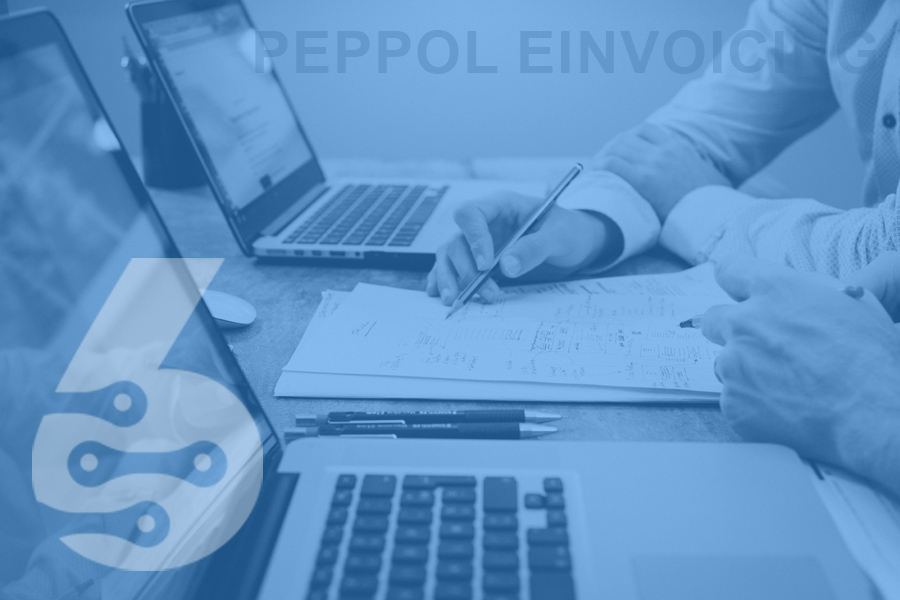- Accounting and Finance
- 25.07.2023
Guide to PEPPOL e-Invoicing
The Future of international electronic invoicing
Dr. Andreas Maier
25.07.2023
“ Electronic invoicing: where paper trails make way for digital efficiency, transforming transactions into seamless experiences and propelling businesses into the future of streamlined finance. “
PEPPOL: a way to simplify global trade
PEPPOL is more than an e-invoicing standard: it is a way to streamline global trade. Its adoption enables companies, large and small, to navigate the complexities of international transactions with ease and efficiency.
It offers multiple benefits, such as the automation of e-invoicing, which minimizes errors and increases productivity. Especially for large companies with significant transaction volumes, this can translate into significant cost and time savings.
PEPPOL's universality also simplifies cross-border trade, enabling companies to access a vast global market. Small and medium-sized enterprises (SMEs), normally constrained by local markets, can thus unlock enormous growth potential.
In addition, being part of the PEPPOL network can provide companies with a unique competitive advantage. As more companies and governments demand PEPPOL compliance, being an early adopter can be the edge your company needs.
PEPPOL Interoperability and Standardization
PEPPOL's success lies in its ability to ensure interoperability between different e-invoicing systems. To achieve this, the framework adheres to internationally recognized standards, such as Universal Business Language (UBL) and Cross Border Invoicing (CII). UBL (ISO 19845) provides a common XML-based format for the exchange of business documents, including invoices, between different systems. CII (ISO 19005-3) is a standardized electronic invoicing format based on the PDF/A-3 specification. By adopting these ISO standards, PEPPOL ensures that invoices can be easily exchanged and understood across multiple platforms and software applications, regardless of the systems used by buyers and suppliers.
Countries Requiring e-Invoicing
Several countries have already mandated the use of eInvoicing to streamline business processes and enhance tax compliance. Notable examples include:
- Italy: As of January 1, 2019, Italy mandates the use of the Sistema di Interscambio (SdI) platform, based on the PEPPOL framework. Italian companies are obliged to submit electronic invoices through the SdI platform, ensuring real-time reporting and reducing tax evasion.
- Spain: Spain introduced the Immediate Supply of Information (SII) system in 2017. It obliges certain companies to submit their invoices electronically to the Spanish Tax Agency (AEAT) within a short period of time.
- Norway: Norway was an early adopter of electronic invoicing and has widely implemented the PEPPOL framework. The Norwegian government requires all its public sector entities to receive and process e-invoices through the PEPPOL infrastructure.
- Sweden: Sweden introduced the SFTI (Svenska Fakturamarknaden) platform, which complies with the PEPPOL framework. It allows the exchange of e-invoices between companies, public bodies and municipalities.
- Denmark: Denmark introduced mandatory e-invoicing for public procurement in 2005. It uses the OIOUBL (Open Infrastructure Online Universal Business Language) standard, which complies with PEPPOL principles.
- France: France introduced mandatory e-invoicing for B2G (business-to-Government) transactions in 2017. The Chorus Pro platform, based on the PEPPOL framework, facilitates the submission and processing of e-invoices to public administrations.
- Netherlands: The Dutch government has adopted e-invoicing, with the Simplerinvoicing initiative, in line with PEPPOL. It mandates the use of e-invoicing in public sector contracts, streamlining procurement processes and reducing administrative burdens.
- Australia: Australia implemented the Peppol e-invoicing framework as the standard for public procurement. It simplifies and speeds up the exchange of invoices between companies and public bodies.
- Singapore: Singapore has adopted the PEPPOL e-invoicing standard to improve efficiency and reduce paperwork in its procurement processes.
Efficiency³ =
SIX ERP² × Simplicity.
PEPPOL Advantages
There are several advantages to mention, but here are the 4 most impactful ones when it comes to an open and international e-invocing framework like PEPPOL:
Simplified cross-border trade
In a globalized marketplace, companies frequently conduct cross-border transactions. However, different regulations, formats and languages often hinder the smooth flow of trade. PEPPOL addresses these challenges by providing a standardized framework that supports cross-border e-invoicing. It enables companies to exchange invoices with partners in different countries seamlessly. The common data format and standardized document exchange protocols facilitate efficient cross-border trade, eliminating the need for costly manual processes, language translation and format conversions.
Increased efficiency and cost savings
Traditional paper-based invoicing involves manual handling, printing and postage, resulting in significant costs and delays. PEPPOL eliminates these inefficiencies by enabling electronic exchange of invoices directly between buyer and supplier systems. Automating the invoicing process significantly reduces human error, speeds payment cycles and minimizes administrative overhead. As a result, companies can allocate resources more efficiently, improve cash flow management and save costs in the long run.
Increased data security and compliance
Data security is a primary concern for companies, especially when it comes to financial transactions. PEPPOL ensures the secure transmission of electronic invoices through the use of digital signatures and encryption mechanisms. These security features safeguard sensitive information and protect against fraud and unauthorized access. In addition, by adhering to international billing standards and regulatory requirements, organizations can ensure compliance and avoid penalties associated with non-compliance.
Scalability and futureproofing
PEPPOL's flexible and scalable architecture allows organizations of all sizes to seamlessly integrate the framework into their existing systems. Whether you are a small business or a large enterprise, PEPPOL adapts to future growth and evolving business needs. In addition, the framework's adaptability allows for the incorporation of new technologies and innovative solutions, ensuring its relevance and effectiveness in the ever-changing digital landscape.
Overcoming Challenges on the Road to PEPPOL Adoption
Despite its obvious advantages, the road to PEPPOL adoption can be fraught with difficulties. These obstacles range from technical complexities to the need to manage change within the organization. However, with the right strategies and resources, these challenges can be successfully addressed.
Technical complexity is often a major obstacle to PEPPOL adoption. The key here is to choose a reliable PEPPOL service provider that can manage the technical details of PEPPOL integration, easing the onboarding process.
Change management is equally crucial. Implementing PEPPOL involves a change to existing business processes, which can generate resistance within the organization. Clear and proactive communication about the benefits of PEPPOL, along with thorough staff training and gradual implementation, can ensure a smooth transition.
Looking ahead: What does the future hold for PEPPOL?
As companies around the world move toward digital transformation, PEPPOL adoption and relevance are poised to increase dramatically. Here's a look into the future:
As the benefits of PEPPOL become increasingly apparent, more countries, especially those outside of Europe, are expected to join the network. Simultaneously, PEPPOL's reach could extend beyond e-invoicing to other electronic business documents, further simplifying business transactions.
In addition, with the integration of emerging technologies such as artificial intelligence and blockchain, PEPPOL's capabilities in security, automation and data analytics will skyrocket.
How to join the PEPPOL Network
The path to joining the PEPPOL Network, while fraught with challenges, can be successfully navigated with careful planning and the right resources.
First, it is paramount to understand the specifics and benefits of PEPPOL. Once that is done, evaluate your current systems, identifying what you need to change to align with PEPPOL.
A crucial step in the process is to choose a software or ERP system that supports PEPPOL integration. Given the growing adoption of PEPPOL, it is advisable to choose a solution that already supports it. This not only reduces implementation complexity, but also saves time.
Conclusion: Harness the future with PEPPOL
PEPPOL emerges as a powerful tool for companies to embrace efficiency and speed up their invoicing. Its advantages are manifold, especially for companies engaged in international trade or seeking to automate their invoicing processes.
As PEPPOL adoption soars, its integration into business operations becomes increasingly crucial. Therefore, when selecting ERP or invoicing systems, companies should prioritize those that support PEPPOL. This can save substantial costs and complexities associated with custom integrations in the future, ensuring that your company remains future proof.
SIX ERP at the forefront of compliance enables companies to benefit emerging standards and allows sending and receiving of PEPPOL compliant eInvoices. Want to learn more about our trend setting ERP? Contact us and talk to one of our consultants on how SIX ERP can help your company to leverage the benefits of Enterprise Resource planning technology to fast forward your business.
About the author
Andreas Maier is a results-driven CEO with nearly 30 years of experience in ERP, digital transformation, and IT consulting. He has held leadership positions in Fortune 100 companies such as rentalcars.com (PCLN) and Intrasoft International, a leading EU-based R&D software vendor. With a Ph.D. in Neural Networks from the University of Cologne, Andreas combines deep technical expertise with a strategic approach to business process optimization.
As the founder and co-founder of multiple successful startups, including XXL Cloud Inc., eShopLeasing Ltd, and WDS Consulting SA, his expertise lies in ERP consulting, IT strategy, and process automation. His work is focused on helping businesses implement scalable ERP solutions, streamline operations, and drive digital transformation.
Related articles

Why Every Business Needs an ERP System
Every business needs an ERP system. An ERP, or enterprise resource planning, system is a software application that enables a company to automate and track tasks across all departments. By...
What makes a good and easy CRM system?
A CRM system is Software that helps businesses manage their customer relationships. It allows companies to track and store customer data, interactions, and contact information in one central location. But...



